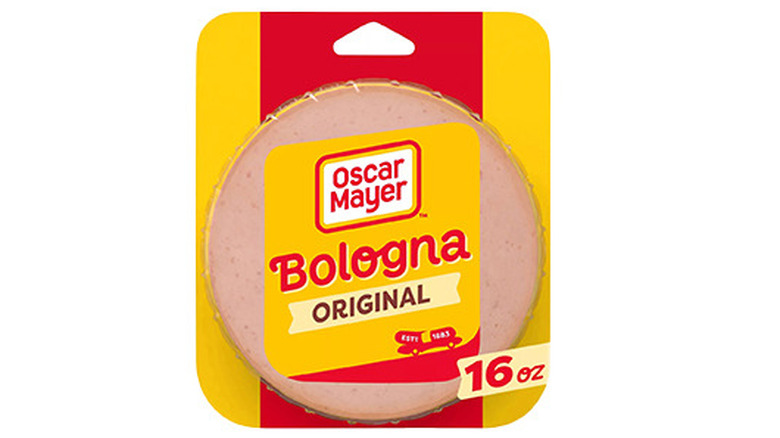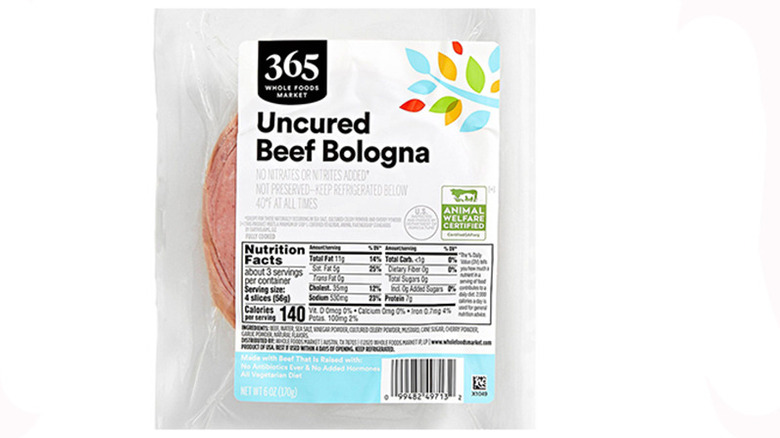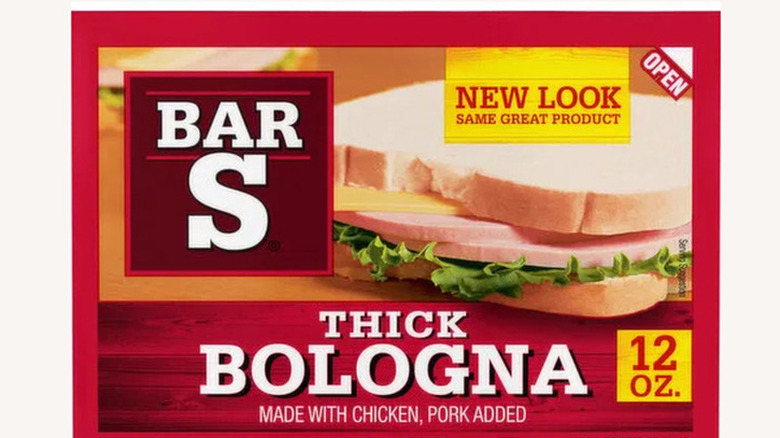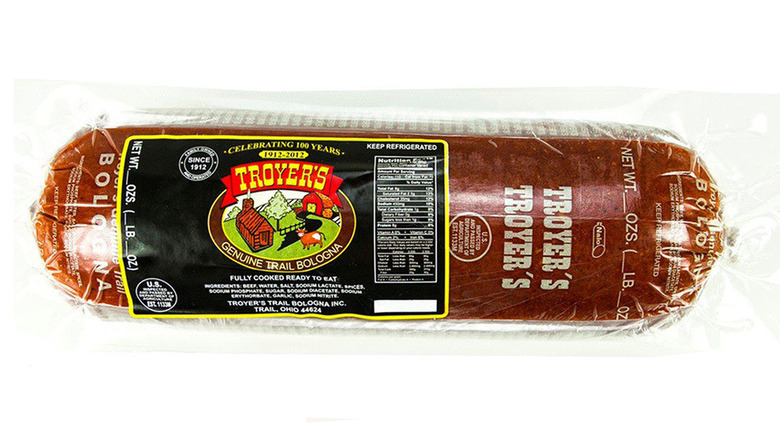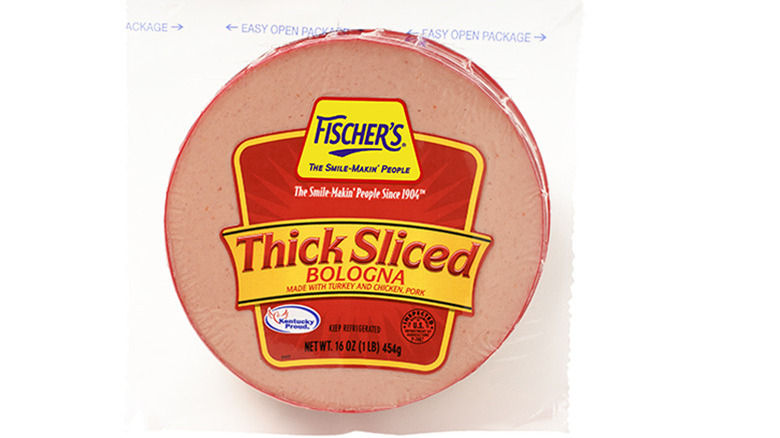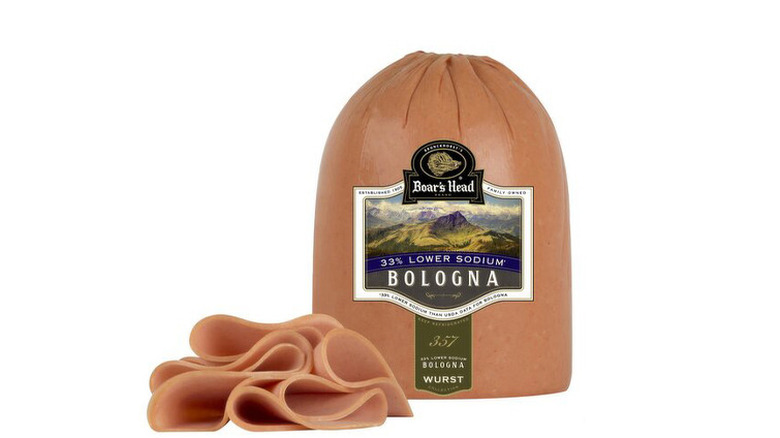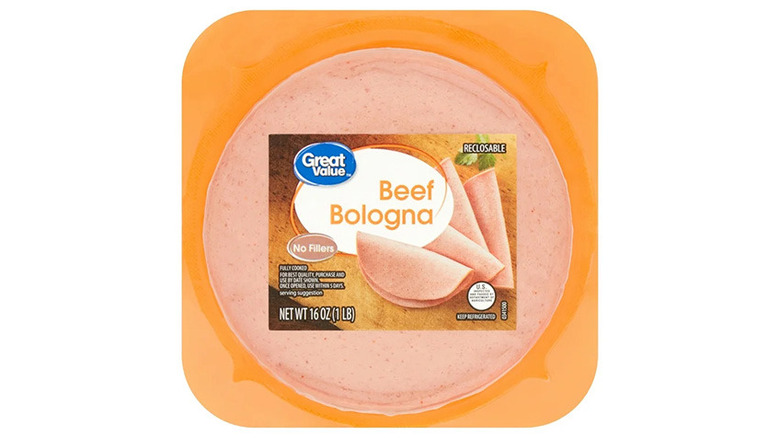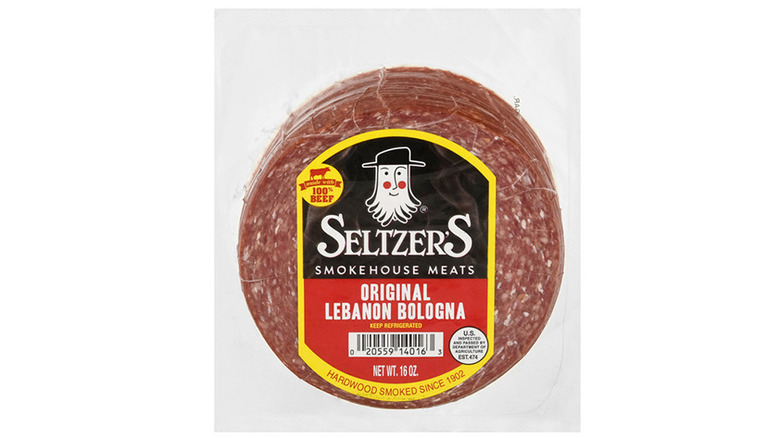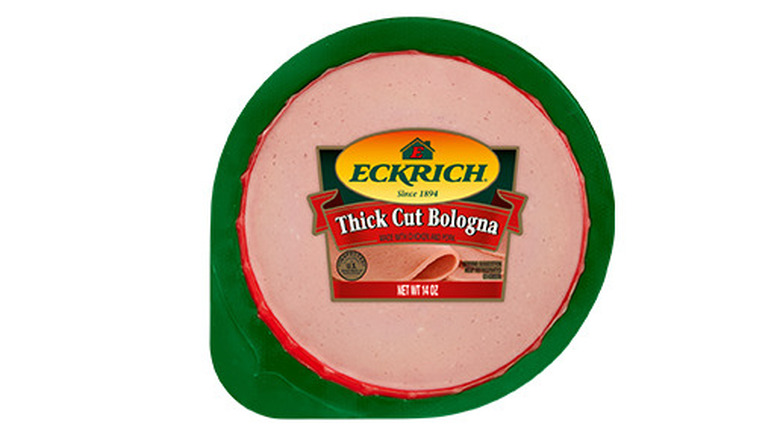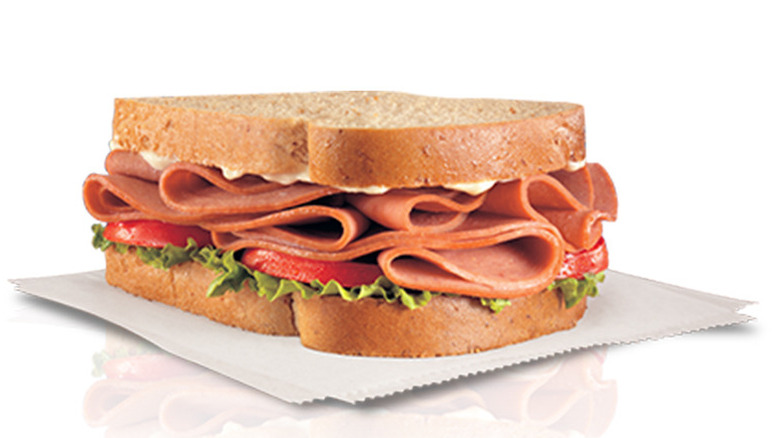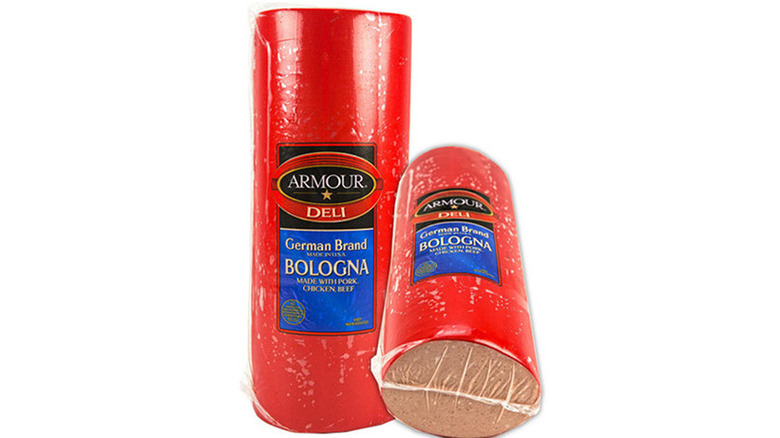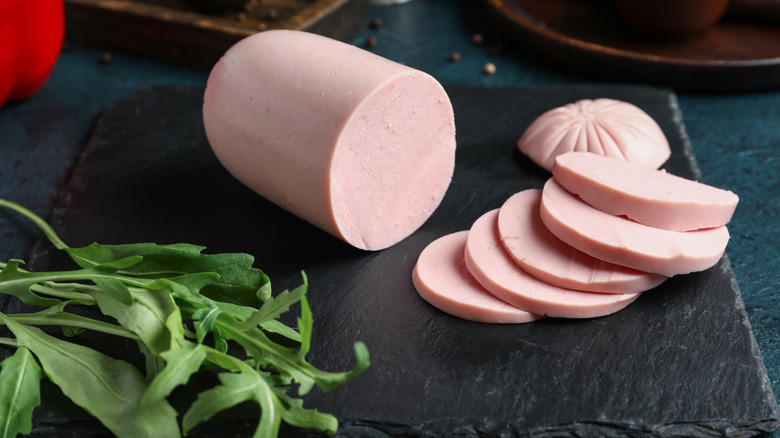Bologna Brands That Use The Highest Quality Ingredients And The Ones You Should Avoid
We may receive a commission on purchases made from links.
When you just now read the word "bologna," did you imagine a perfectly round, slightly greasy slice of uniformly pink meat on white bread with mayo, mustard, and maybe a slice of American cheese? Perhaps in a plastic bag, slightly warm from spending half the school day in your "Ghostbusters" lunch box? It's nostalgic, it's tasty ... but have you ever asked yourself, what is bologna?
The short answer is that it's a large seasoned sausage that can be made with varying degrees of quality. In fact, this American sandwich staple has a long and intermittently respectable history that stretches all the way back to ancient Rome. In the modern era, traditional mortadella — bologna's classier European cousin — is believed to have been transformed into the classic U.S. lunchmeat by German immigrants, and this cheap protein became widespread during the Great Depression.
Nowadays it's possible to find bologna brands that are relatively healthy, but many are made with at least one — and often several — potentially unhealthy ingredients. These may include high doses of sodium, a range of chemical preservatives, and high levels of saturated fat. Ingredients vary widely from brand to brand. If you have a nostalgic hankering for your b-o-l-o-g-n-a while also looking to avoid salt, sugar, preservatives, or various allergens, you can find a number of healthier options below — as well as some to avoid.
Avoid: Oscar Mayer Original Bologna
Oscar Mayer is almost synonymous with the very idea of bologna, a salty slice of reminiscence on Wonder Bread to members of Generation X who grew up glued to prime-time TV singing along to that jingle, beginning with "My bologna has a first name ..." The company has stood the test of time, remaining a leader its meaty field since the late 1800s, when German immigrant Oscar Ferdinand Mayer joined up with his brother to start a sausage business on Chicago's north side. History does not tell us whether Oscar had formulated a bologna recipe at the time, but we're pretty sure that if he had, it wouldn't have included some of today's ingredients — including chemical preservatives like sodium nitrite, which has been linked with cancer risks.
Making matters worse, the Environmental Working Group warns that the meat used in this bologna likely comes from animals that were raised using antibiotics, as well as hormones and/or growth-promoting chemicals. In addition, this classic lunch meat contains corn syrup as its fourth ingredient — and while each slice has 80 calories, 70 of those calories are from fat.
Highest Quality: 365 by Whole Foods Uncured Beef Bologna
Available on Amazon and Whole Foods stores, this uncured sandwich meat is made with the minimal, natural ingredients one would hope to find at the Amazon affiliate most likely to offer in-store samples of local kombucha or organic goat cheese (hint: it's not the Washington Post). While this store-brand bologna does contain cane sugar, it's such a small dose that the nutrition facts still are allowed to list 0 grams of sugar per four-slice serving. Those slices do have a fairly high sodium level, but there's actually a good reason for that, which has to do with food safety.
Essentially, there are two types of preserved meat — cured and uncured. Cured meats are frequently preserved with chemical additives such as sodium nitrate, which has been linked to negative health outcomes, including cancer. Uncured meats, such as this Whole Foods bologna, may include celery powder (which provides a naturally occurring nitrite) as well as increased levels of sodium to prevent spoilage. In addition to bologna, this also explains the difference between cured and uncured hot dogs. The Whole Foods brand provides one of your healthiest choices for bologna, but if you're keeping an eye on your salt intake, note that this uncured product delivers a fairly hefty 530 milligrams of sodium per serving.
Avoid: Bar-S Thick Bologna
Observant readers may note an unfamiliar term in the listed ingredients of many bologna brands, particularly the lower-priced varieties. For example, take a look at the label of Bar-S Thick Bologna, and you'll see that the first ingredient listed is the delightful-sounding mechanically separated chicken. So how does one mechanically separate a chicken? Essentially, cooked chicken is smooshed through a screen under high pressure, ensuring that every little edible bit of meat, fat, and other tasty chicken fragments are separated from the bones. If any of that sounds unpleasant, you probably don't want to know that this chicken paste is sometimes called white slime.
The Environmental Working Group claims that the meat for Bar-S bologna likely comes from animals raised with hormones and antibiotics. In addition, Bar-S bologna contains corn syrup and dextrose — both of which can raise blood sugar levels — as well as preservatives including sodium phosphates (which have been linked to cardiovascular issues) and sodium nitrite. In addition to these eyebrow-raising ingredients, the label of Bar-S mentions that the bologna includes "flavorings." What kind? Oh, that would be giving away the mystery!
Highest Quality: Troyer's Genuine Trail Bologna
Remember those immigrants credited with helping to bring us authentic German-style sausages, made with fresh meats and no unwholesome additives? Their influence remains, and can still be enjoyed around small-town America. Wherever cows and pigs are still raised on family farms, you'll likely find small, artisanal butchers and provisioners who are still making bologna more or less the old-fashioned way.
Unfortunately for those of us seeking this OG flavor, many such brands are only available locally, or sometimes via delivery. Fortunately for anyone hoping to easily enjoy a bologna sandwich like grandma might have eaten, there's Troyer's. Family owned and operated since 1912, the company is run by the fourth generation of Troyers to craft their all-natural beef bologna in the so-small-it-doesn't-even-have-a-zip-code town of Trail, Ohio.
You'll find Troyer's available in old-fashioned rings that resemble something like a big ol' kielbasa sausage, as well as a slice-it-yourself chub (the adorable name for a packaged slab of processed deli meat). Choose the latter and don't stint on generous slices if you'd like to try making a chicken-fried bologna sandwich recipe. While Troyer's Genuine Trail Bologna does contain some FDA-approved preservatives, that downside is balanced out with its all-natural ingredients and lack of fillers.
Avoid: Fischer's Thick Sliced Bologna
While there's quite a range of ingredients and factors that may vary between the most and least healthy grocery-store bologna options, it's all still bologna, not a beet and quinoa salad. If fat and salt are major concerns for you, you'll probably be better off with a far less processed meal altogether.
But even in the land of salty foods you have better and worse options, and at the high end of the sodium scale lies Fischer's Thick Sliced Bologna. With a stunningly high 650 milligrams of sodium per slice, you only need two slices to deliver over half of the 2,300 milligram daily dose recommended as a maximum intake by the FDA. You've probably heard that we're all eating too much salt, and while lunch meat is almost never a low-sodium option, it doesn't have to be this high.
Some of this sodium count comes from a range of preservatives, as Fischer's bologna contains sodium erythorbate, sodium nitrite, and sodium diacetate. While all of these are added to this product within safe limits according to the FDA, in higher doses sodium additives can contribute to high blood pressure and associated risks of heart attacks, strokes, and kidney disease.
Highest Quality: Boar's Head 33% Lower Sodium Bologna
Boar's Head deli meats made the wrong kind of headlines in 2024, when serious problems with a processing plant that made the brand's liverwurst led to nationwide recalls and larger concerns about meat safety. Fortunately, the deadly Boar's Head listeria outbreak appears to be over, although the company remains under close scrutiny.
This all sounds alarming, but it's worth noting that Boar's Head meats have been rated highly for freshness and quality of ingredients, so — presuming that no further recall issues arise — the brand's reputation should be rehabilitated over time. Maintaining the quality of Boar's Head lower-sodium bologna can be considered as a step in the right direction. While this product does contain the potentially problematic preservatives sodium phosphate and sodium nitrite, on the healthy side of the equation, the company boasts that its products contain no MSG, artificial colors, or fillers.
For optimum freshness, visit a grocery store deli where you can order your Boar's Head lunch meats freshly sliced. And do note that while this bologna is advertised as being 33% lower in sodium than the brand's original recipe, it still delivers a solid 360 mg of the stuff per serving. This is lower than many bologna options, but not exactly heart-healthy — especially when you also consider each serving packs 13 grams of fat, with 4.5 of that coming from saturated fats.
Avoid: Great Value Beef Bologna
Dollar for dollar, Walmart's Great Value house brand indeed offers pretty good value for the money. However, as with so many bargains, what you get is what you pay for. With this bologna, what you get includes a number of salty added preservatives, including sodium nitrite, sodium diacetate, and sodium phosphates, the latter additive having been linked to cardiovascular issues and bone disease.
On the plus side, Great Value Bologna is admirably low in sugars — despite containing corn syrup and dextrose, a serving delivers only a single gram of total sugars. This brief feel-good interval comes crashing to a close once we take a look at its fat content. With 8 grams of fat per slice, the overall total is lower than with some options, but fully half of that comes from saturated fat. The American Heart Association recommends you consume less than 13 grams of saturated fat per day — so after three slices of this lunch meat, you're pretty much at that limit.
However, the real red flag here is this bologna's 1 gram of trans fat per slice. Unlike other dietary fats, there's no good amount of trans fats to include in your diet. Trans fats raise your LDL (bad) cholesterol and lower HDL (good) cholesterol, potentially increasing your risk for heart disease and stroke.
Highest Quality: Seltzer's Lebanon Bologna
FDA standards require that bologna must be made from meat reduced to minute particles, which gives the finished product the uniform look we're used to. But Lebanon bologna is not your average sausage. The finished product looks almost like salami when sliced, with darker meat and visible fat.
Despite that latter feature, Seltzer's flagship product is surprisingly low in fat, with a total of 4 grams per serving, and only 1.5 of those grams being saturated fat. The packaged product does contain sodium nitrite as a preservative, but in smaller amounts than sodium erythorbate. While the latter preservative is classed as an additive, the Environmental Working Group states that sodium erythorbate has no known negative health or environmental effects.
Lebanon Bologna has been made in Lebanon County, Pennsylvania since at least 1902, when Harvey Seltzer developed his secret spice mix and meticulous production methods. The bologna's characteristic smoky flavor is due not to additives, as in some lower-quality meats. Instead, this bologna is smoked in old-fashioned wood-fired smokehouses for three days, resulting in a moist, flavorful meat. If you want to eat authentic Lebanon Bologna like a native, spread a slice with cream cheese, roll it up, and enjoy it as a finger food, no bread necessary.
Avoid: Eckrich Thick Cut Bologna
The Eckrich meat company dates back to 1894, when German immigrant Peter Eckrich opened a store in Fort Wayne, Indiana, selling the kind of sausages he fondly recalled from childhood. The company grew considerably over the following years, and changed hands repeatedly, from Beatrice to ConAgra to its current owner, Smithfield Foods — which is now a subsidiary of China's WH Group, a multinational, multi-billion-dollar food-processing concern.
It's worth noting that Smithfield made a fairly big splash in 2017 with the launch of its Pure Farms brand. These meats were advertised as meeting the USDA's highest standards with minimal processing and no antibiotics, steroids, hormones, or artificial ingredients. Eckrich Thick Cut Bologna does not belong to the Pure Farms line — draw your own conclusions. Relatively high in sodium with 540 milligrams per serving, this bologna also contains preservatives like sodium phosphate and sodium nitrite, which have been linked to negative health outcomes.
Highest Quality: Hebrew National Beef Bologna
Hebrew National has long insisted that its meat production is overseen by a higher authority than the USDA — yet their beef bologna is a textbook example of how a product can generally be high quality while still having ingredients that some shoppers will want to avoid. On balance, a number of factors nudge it into the recommended category, although not without a few caveats. Let's start with the upsides.
While many commercial bolognas are, according to their labels, made with only beef, that doesn't guarantee that the beef is produced with kosher guidelines, making them a poor choice for anyone who follows a strictly kosher diet. As one would expect, Hebrew National uses only 100% kosher beef for its products. Additionally, this bologna is made with zero added sugars or sweeteners, and provides 4% of your daily iron needs per serving.
On the less-healthy side of the equation, this bologna does contain sodium nitrite and, of greatest concern, a half gram of trans fat per serving. While this sounds low, the fact is that trans fats are linked to heart disease, strokes, and diabetes. Finally, if you have a soy allergy, note that this bologna does contain the potential allergen, in the form of hydrolyzed soy protein.
Avoid: Armour German Brand Bologna
After its Chicago launch in 1867, Armour soon ranked among the most successful businesses in the entire city. It went on to become one of America's top meat-processing companies. In the late 1800s, the company was known for its poor working conditions and union-busting activities. These days, that's all just a part of Chicago's sometimes-sketchy history, as Armour is currently owned by lunch-meat titan Smithfield Foods.
While sliced-to-order deli meats are often higher quality than prepackaged slices, this brick of German beef bologna is hardly a health-conscious choice. Every 200-calorie serving of this meat contains a whopping 17 grams of fat, with 5 of those grams coming from saturated fat — so every serving contains about a quarter of your entire daily recommended dose of both total and saturated fats. In addition, this bologna delivers a fairly hefty 380 milligrams of sodium per serving, and includes chemical additives including sodium phosphates — which has been linked to kidney and cardiovascular issues — as well as sodium nitrite, which some studies indicate may be carcinogenic.
Highest Quality: Yves Veggie Bologna
Plant-based foods are increasingly gaining mainstream approval, so it's little wonder that bologna slices would join the array of meat substitutes in your local health-conscious grocery stores. While the certified-vegan slices of Yves Veggie Bologna aren't recommended for anyone with soy or gluten sensitivities, that's one of their few downsides. There are many versatile vegan meat alternatives available these days to try out, many made with the wheat gluten (also known as seitan) that is used in Yves meat-free bologna. Enriched with an impressive roster of vitamins and minerals, each three-slice serving provides 20% of the average daily recommended dose of iron, 15% of your Vitamin B12, and 15% of daily zinc needs.
On just about every metric these slices check the "healthy" box, with each serving containing only 1 gram of fat, no cholesterol, and 10 grams of protein. Fans swear that the texture and flavor of Yves vegan bologna is so good that you'll never even miss the real (mechanically separated) deal. As a bonus, most Yves products — including this bologna — are certified kosher by the Orthodox Union.
Methodology
You know that aphorism about how anyone who respects the law or sausages shouldn't watch either of them being made? Well, while you might still want to avert your eyes from the mechanical chicken separator, our methodology for these bologna assessments is an open book. As in so many things that exist on a spectrum, the very best and very worst options are relatively easy to pinpoint. But, especially with a food like bologna, which gets much of its deliciousness from fat and salt, different people may have different criteria for the most healthy choice depending on their particular nutritional needs.
The factors that led to a bologna brand being designated as one to avoid included incorporating more highly processed meats; added sugars, grams of saturated fat, and trans fats; and preservatives linked to negative health outcomes, particularly sodium phosphate and sodium nitrite. If you absolutely love one of the brands we're suggesting you avoid, see whether a healthier option might hit the spot for you. If not, know that any of these meats should be fine in moderation, providing they don't contain an ingredient your doctor has specifically warned you to avoid.

